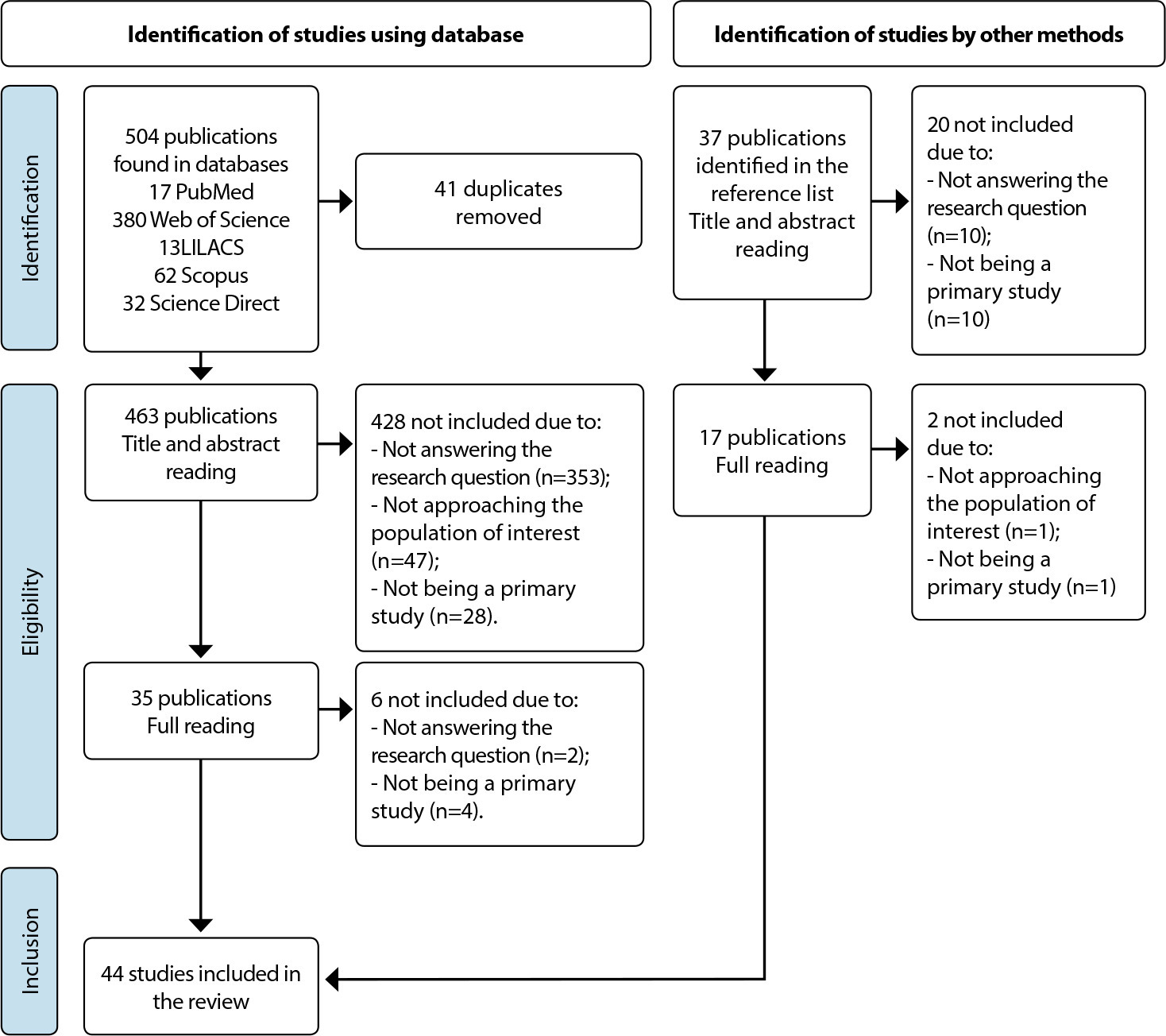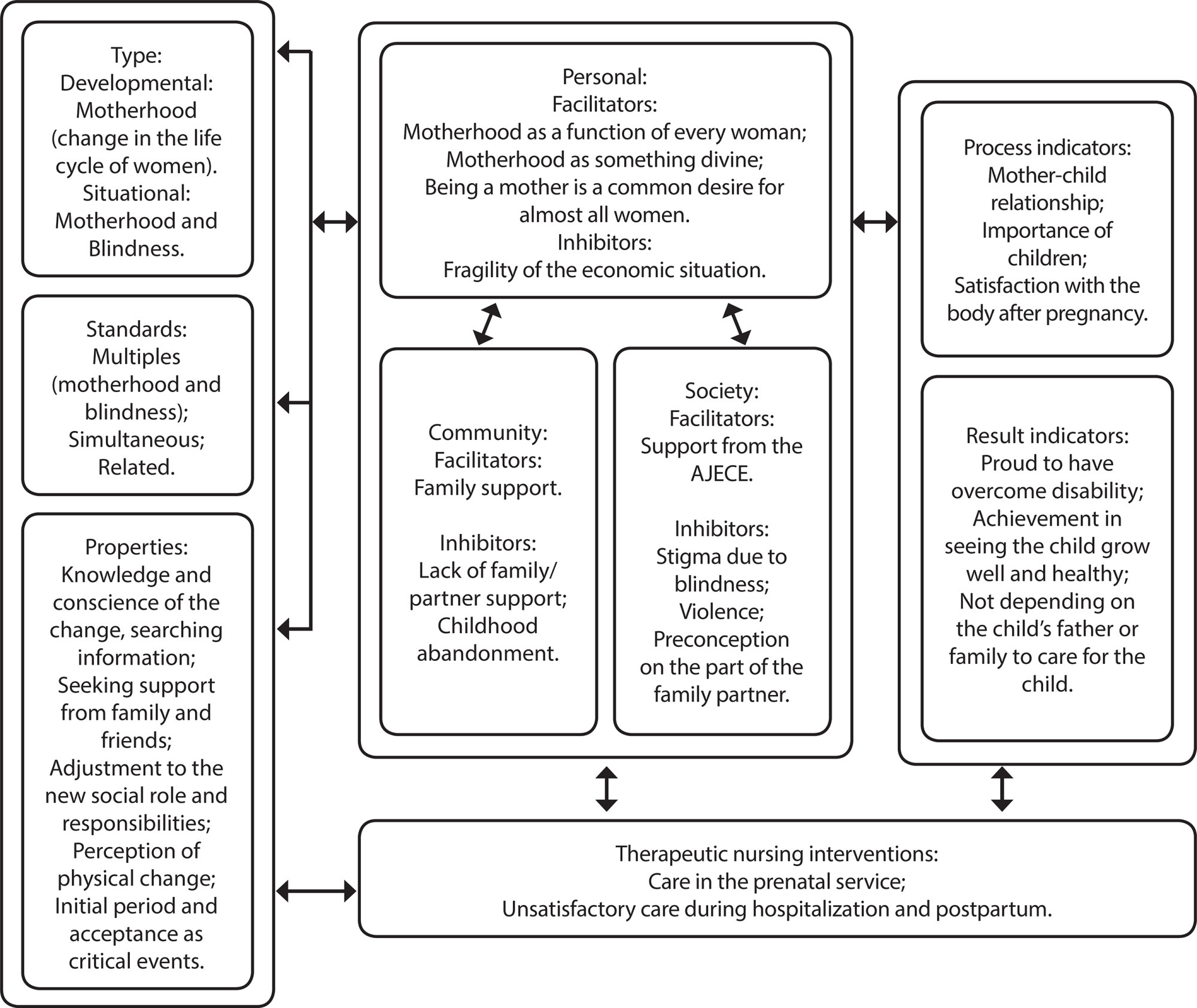-
REVIEW
Health needs of mothers of children with Congenital Zika Syndrome: an integrative review
Revista Brasileira de Enfermagem. 2022;75(Suppl 2):e20210540
04-22-2022
Resumo
REVIEWHealth needs of mothers of children with Congenital Zika Syndrome: an integrative review
Revista Brasileira de Enfermagem. 2022;75(Suppl 2):e20210540
04-22-2022DOI 10.1590/0034-7167-2021-0540
Visualizações0ABSTRACT
Objectives:
to evidence and analyze the health needs of mothers of children with Congenital Zika Syndrome.
Methods:
a total of 44 articles published between October/2015 and March/2021 on PubMed, LILACS, Scopus, Web of Science and Science Direct were included. The RTI bank and CASP score were applied to classify the methodological quality of the studies. Reflective content analysis and Cecílio and Matsumoto’s taxonomy were used for analysis. Visual map was used as a technique for presenting the results.
Results:
mothers need access to social protection, family-centered, multi-professional empathetic monitoring, cultivating bonds and affection by professionals, sharing of care between health network services, strengthening the social support network and fostering coexistence groups between them.
Final Considerations:
intersectoral initiatives must be implemented for better housing conditions, fighting stigma, holding parents accountable and resuming life project.
Palavras-chave: CaregiversCongenital AbnormalitiesHealth Service Needs and DemandMaternal and Child HealthZika Virus InfectionVer mais
-
ORIGINAL ARTICLE
Transition of blind women to motherhood from the perspective of Transitions Theory
Revista Brasileira de Enfermagem. 2020;73(suppl 4):e20190234
09-21-2020
Resumo
ORIGINAL ARTICLETransition of blind women to motherhood from the perspective of Transitions Theory
Revista Brasileira de Enfermagem. 2020;73(suppl 4):e20190234
09-21-2020DOI 10.1590/0034-7167-2019-0234
Visualizações0Ver maisABSTRACT
Objective:
to analyze the transition of blind women to motherhood from the perspective of Transitions Theory.
Method:
a qualitative, descriptive study, which had as participants 11 blind women. An open interview was conducted using the narrative method. Analysis occurred in the light of Transitions Theory, with approval from the Research Ethics Committee with Human Beings.
Results:
the age group was 32 to 63 years, mostly Catholic, with social security benefits. Transition to motherhood mainly evidenced the experience when becoming a mother and feelings related to this new phase of life.
Final considerations:
the women in the study adapted themselves to the maternal role, even with difficulties, developed healthy relationships with their children, overcame their disability and nurtured dreams and desires. They were aware of their role, achieving with mastery a healthy transition. It was evidenced scarcity of nursing therapies.

-
EXPERIENCE REPORT
Mothers mothering in prison: an experience report of the nursing care project
Revista Brasileira de Enfermagem. 2020;73(3):e20180932
04-22-2020
Resumo
EXPERIENCE REPORTMothers mothering in prison: an experience report of the nursing care project
Revista Brasileira de Enfermagem. 2020;73(3):e20180932
04-22-2020DOI 10.1590/0034-7167-2018-0932
Visualizações0Ver maisABSTRACT
Objectives:
to report the experience of designing and implementing the nursing care project with mothers and babies in prison.
Methods:
this is an experience report about the nursing care project with mothers and children in prison, having as a guiding axis Winnicottian concepts about the mother-baby relationship.
Results:
nursing consultations were held in childcare, thematic conversation circles and the manufacture of artifacts to encourage child development, as well as women’s health care. The positive impact of the project has made it a health education program.
Final Considerations:
elaborating the nursing care project encouraged other ways of providing care and implementing it, using Winnicottian concepts. It is recommended that training institutions consider the prison and the individuals there as a field in the learning process of health professionals.
-
ORIGINAL ARTICLE
Case management as a high-risk prenatal care strategy
Revista Brasileira de Enfermagem. 2019;72(3):692-699
06-27-2019
Resumo
ORIGINAL ARTICLECase management as a high-risk prenatal care strategy
Revista Brasileira de Enfermagem. 2019;72(3):692-699
06-27-2019DOI 10.1590/0034-7167-2018-0483
Visualizações0ABSTRACT
Objective:
to discuss the benefits of using high-risk prenatal case management.
Method:
a qualitative, convergent care study with six high-risk pregnant women, performed in a municipality in the south of Brazil. Data were produced by case management from April to August of 2017 through observation-participant. Analysis followed the processes of Convergent Care Research: apprehension, synthesis, theorization and transfer.
Results:
case management identified important elements in the care of pregnant women, which denoted a greater complexity to the cases; was shown as a relevant space for nurses to act, because it is an intervention that requires knowledge and specific skills.
Final considerations:
case management provides differentiated management in complex cases, facilitates the flow between health services, concretizing the comprehensiveness and equity of the care. It was found, in the convergence between research and care, that participants were benefited by case management.
Palavras-chave: High Risk PregnancyMaternal and Child HealthMaternal Health ServicesObstetric NursingPrenatal CareVer mais



